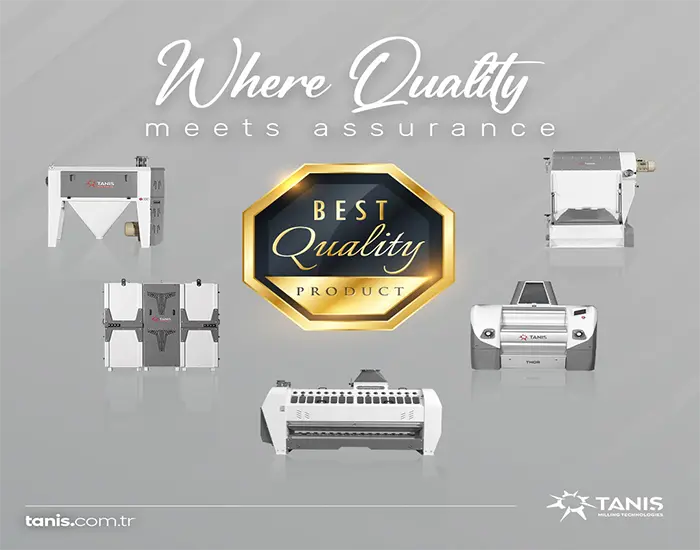Compliance with standards and regulations in the milling and flour industry is both a legal requirement and a strategic necessity that provides competitive advantage. Compliance with regulations in areas such as food safety, product quality, environmental protection, and occupational health is of critical importance for the sustainable success of businesses.
As Tanış A.Ş., with our over 60 years of industry experience, we offer comprehensive expertise on standards and regulations in the milling and flour industry. In this content, we address the fundamental standards, legal regulations, and compliance processes in the industry.
ISO 22000 Food Safety Management System
Basic Requirements:
Interactive communication
System management
Prerequisite programs
HACCP principles
Continuous improvement
Applications in Milling Operations:
Hazard analyses from raw material acceptance to final product
Supplier evaluation and control systems
Hygiene and sanitation programs
Allergen management system
Traceability and recall procedures
Advantages:
Easy access to international markets
Increase in customer trust and satisfaction
Effective management of food safety risks
Increase in operational efficiency
7 HACCP Principles:
Conduct hazard analysis
Determine critical control points
Establish critical limits
Create monitoring procedures
Determine corrective actions
Create verification procedures
Documentation and record keeping
Critical Control Points in Milling Facilities:
Wheat acceptance and storage conditions
Tempering and moisture control processes
Mycotoxin control and screening processes
Metal detector and magnet controls
Flour storage and packaging processes
BRC Global Standard for Food Safety:
Developed to meet UK retail sector requirements
Covers food safety, quality, legal compliance, operational controls
IFS Food Standard:
Developed by German and French retailers
Widely accepted in Europe
FSSC 22000:
Combines ISO 22000 and PRP
GFSI recognized
Wheat, Flour and Flour Product Quality Standards
TSE Standards
TS 2974: Wheat flour
TS 4500: Bread wheat
TS 2383: Durum wheat
TS 1620: Whole wheat flour
ICC Standards
ICC 105/2: Protein analysis
ICC 107/1: Wet gluten
ICC 115/1: Falling number
ICC 155: Gluten index
Turkish Food Codex and Related Regulations
Main Reference: Law No. 5996
Communiqué Highlights:
Product definition and classification
Composition, quality, additive and contaminant limits
Hygiene criteria, labeling and allergen declarations
Key EU Regulations:
(EC) No 178/2002
(EC) No 852/2004
(EC) No 1169/2011
(EC) No 1881/2006
Export Requirements:
RASFF notifications
Traceability systems
Residue and mycotoxin controls
US FDA Requirements:
FSMA compliance
FDA facility registration
Food defense and risk-based preventive controls
Special Market Requirements:
Halal (Middle East)
Radiation/pesticide limits (Japan)
EAC certification (Russia)
MERCOSUR standards (Latin America)
Machine Safety and CE Marking
Machinery Safety Regulation (2006/42/EC):
Risk assessment and operator safety
CE process: directive matching, file preparation, declaration
ATEX Directive and Explosion Safety
Key Directives:
2014/34/EU (equipment)
1999/92/EC (workplace safety)
Facility Applications:
Zone classification
Grounding and suppression systems

Standards Compliance Support and Our Consultancy Services
Our Legislation Monitoring and Update Services
Scope:
Regulatory updates
Compliance impact analysis
Action planning and documentation
System Installation and Certification Consultancy
Services:
ISO, HACCP, BRC systems
Gap analysis and training
Audit preparation
Technical Compliance and CE Marking Support
Support Includes:
Directive identification
Risk assessment
File preparation
Type tests and CE mark process
ATEX-Specific Services:
Zone identification
Equipment category determination
Protection documentation

Environmental Permit and License Requirements
Includes:
Air, water, noise, and waste management
EIA procedures for new and expanded facilities
ISO 14001 Environmental Management System
Focus Areas:
Water and energy usage
Waste and emissions
Dust and chemical control
Occupational Health and Safety Law Applications
Requirements under Law No. 6331:
Risk assessments
Emergency and training plans
OHS personnel assignments
Milling-Specific Risks:
Dust explosion
Noise, machinery, chemicals, working at heights
ISO 45001 Occupational Health and Safety Management System
Benefits:
Reduced accidents
Legal protection
Employee engagement
Brand reputation
Food Traceability Systems and Legal Requirements
Legal Points:
“One step forward, one step back”
Record keeping and recall systems
Traceability Components:
Supplier and batch tracking
Product identification
Storage and shipment records
Halal, Kosher and Special Certification Requirements
Halal Certification:
Islamic-compliant production and sourcing
Certification bodies: TSE Halal, GIMDES, JAKIM
Kosher Certification:
Jewish dietary law compliance
Certification bodies: OU, OK, Star-K
Other Certifications:
Gluten-free
Vegan/Vegetarian
Organic
Non-GMO
Frequently Asked Questions
HACCP is mandatory in Turkey. ISO 22000 strengthens domestic credibility. For exports, consider BRC, IFS, or FSSC 22000 depending on target markets.
Common issues: documentation gaps, poor traceability, lack of internal audits, and training deficits. Prevention: gap analysis, internal audits, ongoing training.
